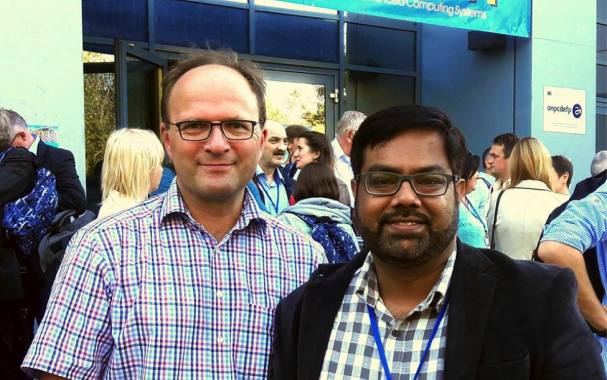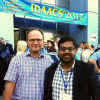
Dr. Adeel Pasha, Assistant Professor and Director of the Electronics and Embedded Systems Lab (EESL) at the Department of Electrical Engineering (EE), Syed Babar Ali School of Science and Engineering (SBASSE) presented three research papers at the 9th IEEE International Conference on Intelligent Data Acquisition and Advanced Computing: Technology and Applications (IDAACS 2017) held in Bucharest, Romania on September 21-23, 2017.
Dr. Pasha's papers included Performance Evaluation of IEEE 802.15.4-Compliant Smart Water Meters for Automating Large-Scale Waterways; Energy Efficient Sensor Network Routing (EESNR) Protocol for Large Distributed Environmental Monitoring Applications and Area-Efficient and High-Throughput Hardware Implementations of TAV-128 Hash Function for Resource-Constrained IoT Devices.
The main goal of the annual IDAACS conferences is to provide a forum for high quality reports on the state-of-the-art theory, technology and applications of intelligent data acquisition and advanced computer systems as used in measurement, automation, and scientific research, in industry and in business. Rapid developments in these areas have resulted in more intelligent, sensitive, and accurate methods of data acquisition and data processing in manufacturing, in the environmental monitoring, in medical monitoring systems and in laboratory measurement equipment. Advanced methods have been developed to enhance the measurement of information for automation, in process inspection, quality control, diagnostics, and other processes.
The details on individual papers are as follows:
Performance Evaluation of IEEE 802.15.4-Compliant Smart Water Meters for Automating Large-Scale Waterways
Abstract: Climate change and resultant scarcity of water are becoming major challenges for countries around the world. With the advent of Wireless Sensor Networks (WSN) in the last decade and a relatively new concept of Internet of Things (IoT), embedded systems developers are now working on designing control and automation systems that are lower in cost and more sustainable than the existing telemetry systems for monitoring. The Indus River basin in Pakistan has one of the world’s largest irrigation systems and it is extremely challenging to design a low-cost embedded system for monitoring and control of waterways that can last for decades. In this paper, we present a hardware design and performance evaluation of a smart water metering solution that is IEEE 802.15.4-compliant. The results show that our hardware design is as powerful as the reference design, but allows for additional flexibility both in hardware and in firmware. The indigenously designed solution has a power added efficiency (PAE) of 24.7% that is expected to last for 351 and 814 days for nodes with and without a power amplifier (PA). Similarly, the results show that a broadband communication (434 MHz) over more than 3km can be supported, which is an important stepping stone for designing a complete coverage solution of large-scale waterways.
The paper was co-authored by Zahoor Ahmad (MS EE 2016), Awais Ahmad (MS EE 2015), Dr. Abubakr Muhammad and Dr. Shahid Masud from the Electrical Engineering Department, LUMS. Dr. Axel Sikora and Manuel Schappacher from the Institute of Reliable Embedded Systems and Communication Electronics, Hochschule Offenburg, Offenburg, Germany also contributed to this joint work.
Energy Efficient Sensor Network Routing (EESNR) Protocol for Large Distributed Environmental Monitoring Applications
Abstract: Due to climate change and scarcity of water reservoirs, monitoring and control of irrigation systems is now becoming a major focal area for researchers in Cyber Physical Systems (CPS). Wireless Sensor Networks (WSNs) are rapidly finding their way in the field of irrigation and play the key role as data gathering technology in the domain of IoT and CPS. They are efficient for reliable monitoring, giving farmers an edge to take precautionary measures. However, designing an energy-efficient WSN system requires a cross-layer effort and energy-aware routing protocols play a vital role in the overall energy optimisation of a WSN. In this paper, we propose a new hierarchical routing protocol suitable for large area environmental monitoring such as large-scale irrigation network existing in the Punjab province of Pakistan. The proposed protocol resolves the issues faced by traditional multi-hop routing protocols such as LEACH, M-LEACH and I-LEACH, and enhances the lifespan of each WSN node that results in an increased lifespan of the whole network. We used the open-source NS3 simulator for simulation purposes and results indicate that our proposed modifications result in an average 27.8% increase in lifespan of the overall WSN when compared to the existing protocols.
The paper was co-authored by Awais Ahmad (MS EE 2015), Zahoor Ahmad (MS EE 2016), and Dr. Shahid Masud from the EE department, LUMS. Dr. Axel Sikora from Hochschule Offenburg, Germany also contributed to editing the paper.
Area-Efficient and High-Throughput Hardware Implementations of TAV-128 Hash Function for Resource-Constrained IoT Devices
Abstract: As the Internet of Things (IoT) continues to grow; the need for lightweight cryptography intensifies. Research in this direction has presented us with novel encryption and hash algorithms that continue to decrease in circuit size at the cost of increase in execution time and relaxation in required security level. Perhaps the most resource-constrained devices present in the IoT domain are RFID tags, which provide a maximum area of around 4000 GE (Gate Equivalent) for security purposes. We propose a hardware implementation of TAV-128, a hash algorithm, which can be used in these resource-constrained devices. We show that it is comparable with current lightweight cryptography proposals. In addition, we perform the comparison of software implementation of TAV-128 with existing popular soft cryptographic algorithms and demonstrate that it is efficient in terms of execution time and code size as well.
The paper was co-authored by Ramla Ijaz, Research Associate to Dr. Adeel Pasha at the EE Department, LUMS. Ms. Ramla is currently pursuing her PhD at the RICE University USA.





